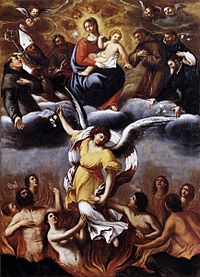
Back Vaevuur Afrikaans Fegefeuer ALS المطهر Arabic المطهر ARZ Purgatoriu AST Araf Azerbaijani Purgatoryo BCL Чысцец (каталіцтва) Byelorussian Чистилище Bulgarian Purgatori Catalan

Purgatory (Latin: purgatorium, borrowed into English via Anglo-Norman and Old French)[1] is a passing intermediate state after physical death for purifying or purging a soul. A common analogy is dross being removed from metal in a furnace.
In Catholic doctrine, purgatory refers to the final cleansing of those who died in the State of Grace, and leaves in them only "the holiness necessary to enter the joy of heaven";[2] it is entirely different from the punishment of the damned and is not related to the forgiveness of sins for salvation. A forgiven person can be freed from their "unhealthy attachment to creatures" by fervent charity in this world, and otherwise by the non-vindictive "temporal (i.e. non-eternal) punishment" of purgatory.[2]: 1472, 1473
In late medieval times, metaphors of time, place and fire were frequently adopted. Catherine of Genoa (fl. 1500) re-framed the idea as ultimately joyful. It has been portrayed in art as an unpleasant (voluntary but not optional) "punishment" for unregretted minor sins and imperfect contrition (fiery purgatory) or as a joyful or marvelous final relinquishment of worldly attachments (non-fiery purgatory.)
The Eastern Orthodox churches have somewhat different formulations of an intermediate state. Most Protestant denominations do not endorse the Catholic formulation. Several other religions have concepts resembling Purgatory: Gehenna in Judaism, likewise al-A'raf which is a area to cleanse "neutrals" in Islam, Naraka in Hinduism.
The word "purgatory" has come to refer to a wide range of historical and modern conceptions of postmortem suffering short of everlasting damnation.[3] English-speakers also use the word analogously to mean any place or condition of suffering or torment, especially one that is temporary.[4]
- ^ "Purgatory", Oxford English Dictionary
- ^ a b Catechism of the Catholic Church #1030−1031. Archived from the original on 22 February 2019. Retrieved 8 March 2019.
- ^ Cite error: The named reference
EBwas invoked but never defined (see the help page). - ^ "purgatory definition – English definition dictionary – Reverso". dictionary.reverso.net. Archived from the original on 2007-09-12. Retrieved 2007-12-20. - "a place or condition of suffering or torment, esp. one that is temporary"
© MMXXIII Rich X Search. We shall prevail. All rights reserved. Rich X Search